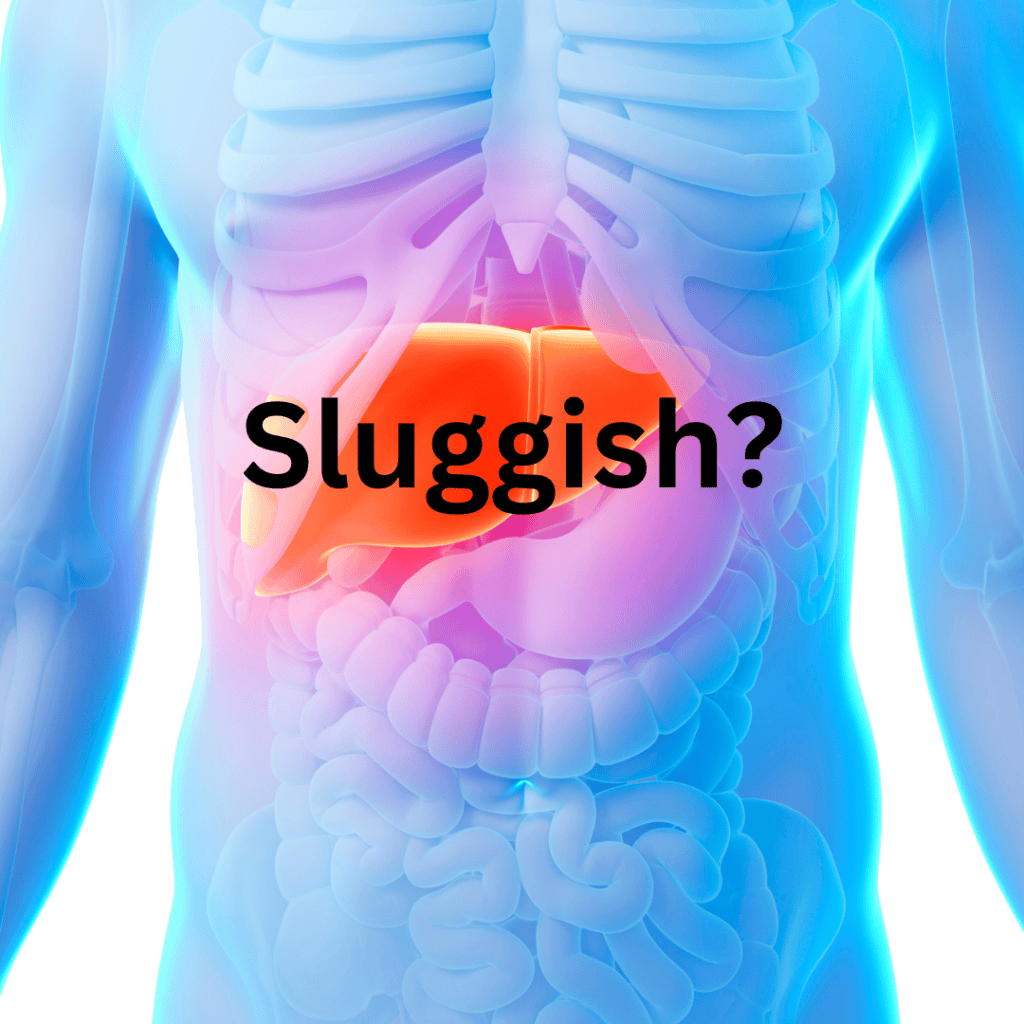15 Signs You Have A Sluggish Liver
Are you tired of feeling tired all the time? Do you struggle with digestive issues, skin problems, or mood swings? You might be surprised to learn that a sluggish liver could be the root cause of your symptoms. In this post, we’ll explore 15 signs that your liver might be struggling to keep up with its detoxification duties.

What Is A Sluggish Liver?
A sluggish liver is a common condition where the liver’s natural detoxification processes are impaired, leading to a buildup of toxins and waste products in the body. This can have far-reaching consequences for overall health, energy levels, and even skin health.
Symptoms Of A Sluggish Liver
1. Fatigue and Low Energy
Feeling exhausted all the time is a common symptom of a sluggish liver. When your liver isn’t functioning properly, it can lead to a buildup of toxins in your body, causing fatigue and low energy levels. [1]
2. Digestive Issues
A sluggish liver can cause digestive problems like bloating, gas, and constipation. If you experience frequent stomach discomfort, it might be a sign that your liver needs some TLC. [2]
3. Skin Problems
Acne, eczema, and other skin issues can be linked to a sluggish liver. When your liver isn’t detoxifying properly, toxins can build up in your skin, leading to breakouts and other skin problems. [3]
4. Mood Swings and Anxiety
A sluggish liver can cause mood swings, anxiety, and depression. When your liver isn’t functioning properly, it can lead to an imbalance of neurotransmitters, affecting your mood and mental health. [4]
5. Brain Fog and Memory Loss
If you’re experiencing brain fog, memory loss, or difficulty concentrating, it could be a sign of a sluggish liver. A healthy liver is essential for cognitive function and memory. [5]

6. Weight Gain and Obesity
A sluggish liver can make it difficult to lose weight and maintain weight loss. When your liver isn’t functioning properly, it can lead to metabolic problems and weight gain. [6]
7. Insomnia and Sleep Disturbances
Difficulty sleeping or insomnia can be a sign of a sluggish liver. When your liver isn’t detoxifying properly, it can disrupt your sleep patterns and cause insomnia. [7]
8. Hormonal Imbalances
A sluggish liver can cause hormonal imbalances, leading to issues like thyroid problems, adrenal fatigue, and polycystic ovary syndrome (PCOS). [8]
9. Joint Pain and Inflammation
Joint pain and inflammation can be a sign of a sluggish liver. When your liver isn’t functioning properly, it can lead to inflammation and pain in your joints. [9]
10. Bad Breath and Body Odor
Bad breath and body odor can be a sign of a sluggish liver. When your liver isn’t detoxifying properly, toxins can build up in your body, causing unpleasant odors. [10]
11. Menstrual Irregularities
Menstrual irregularities, such as heavy or light periods, can be a sign of a sluggish liver. A healthy liver is essential for hormonal balance and menstrual regularity. [11]
12. Sensitive to Chemicals and Perfumes
If you’re highly sensitive to chemicals and perfumes, it could be a sign of a sluggish liver. When your liver isn’t functioning properly, it can make you more susceptible to chemical sensitivities. [12]
13. Bloating and Water Retention
Bloating and water retention can be a sign of a sluggish liver. When your liver isn’t functioning properly, it can lead to fluid retention and bloating. [13]
14. Loss of Appetite
A loss of appetite can be a sign of a sluggish liver. When your liver isn’t functioning properly, it can lead to a decrease in appetite and weight loss. [14]
15. Yellowing of the Skin and Eyes
The yellowing of the skin and eyes, also known as jaundice, is a sign of a severe liver problem. If you’re experiencing this symptom, seek medical attention immediately. [15]
If you’re experiencing several of these symptoms, it’s essential to take action to support your liver health. A healthy liver is crucial for overall well-being, and making simple changes to your diet and lifestyle can make a significant difference.
How does the Liver Detox?
We must understand how our liver detoxes before we can heal it.
Phase 1 and Phase 2 Liver Detox: The Two-Step Process
The liver is responsible for detoxifying the body by removing toxins and waste products. This process occurs in two phases: Phase 1 and Phase 2 liver detox.
Phase 1 Liver Detox:
In Phase 1, the liver uses enzymes to convert fat-soluble toxins into water-soluble compounds. This process is called hydroxylation. During Phase 1, the liver:
- Converts toxins into intermediate compounds: The liver uses enzymes to break down toxins into intermediate compounds, making them more water-soluble.
- Produces free radicals: The liver produces free radicals as a byproduct of the detoxification process. Free radicals can damage liver cells and other tissues if not neutralized.
Phase 2 Liver Detox:
In Phase 2, the liver conjugates the intermediate compounds from Phase 1 with other molecules to create a water-soluble compound that can be excreted. During Phase 2, the liver:
- Conjugates toxins with other molecules: The liver conjugates the intermediate compounds with molecules like glucuronic acid, sulfur, or amino acids to create a water-soluble compound.
- Excretes the conjugated toxins: The liver excretes the conjugated toxins into the bile, which is then eliminated through the gut or excreted through the kidneys.
Importance of Both Phases:
Both Phase 1 and Phase 2 are crucial for effective liver detoxification. If Phase 1 is impaired, toxins can accumulate in the liver and cause damage. If Phase 2 is impaired, the conjugated toxins can build up in the liver and cause further damage.
Here are some vitamins and nutrients that support both phases:
Phase 1 Liver Detox Nutrients:
- Vitamin C: Enhances the activity of Phase 1 enzymes, promoting the breakdown of toxins.
- Vitamin E: Acts as an antioxidant, protecting the liver from oxidative stress and damage.
- N-Acetyl Cysteine (NAC): Supports the production of glutathione, a powerful antioxidant that helps neutralize free radicals.
- B Vitamins: Particularly B2, B3, B5, and B6, which are involved in the metabolism of toxins and the production of energy.
- Magnesium: Essential for the activation of Phase 1 enzymes and the metabolism of toxins.
- Iron: Necessary for the production of hemoglobin, which helps transport oxygen to the liver and supports detoxification.
- Zinc: Involved in the regulation of Phase 1 enzymes and the metabolism of toxins.
Phase 2 Liver Detox Nutrients:
- Glutathione: A powerful antioxidant that conjugates with toxins, making them water-soluble and easier to excrete.
- Sulfur-containing amino acids: Such as methionine, cysteine, and taurine, which support the conjugation of toxins with sulfur.
- Glycine: Involved in the conjugation of toxins with glycine, making them more water-soluble.
- Taurine: Supports the conjugation of toxins with taurine, making them more water-soluble.
- Vitamin B12: Necessary for the metabolism of fatty acids and the production of energy.
- Folate: Involved in the metabolism of toxins and the production of energy.
- Choline: Supports the transport of fats and cholesterol into the liver for detoxification.
Top Supplements for Liver Detox: Backed by Scientific Studies
Lifestyle will be very important in healing a sluggish liver but I have found supplements to be super impactful. Here are some backed by science:
Here are some of the best supplements for liver detox, backed by scientific studies:
- Milk Thistle (Silymarin):
- Study: A 2016 study published in the Journal of Ethnopharmacology found that silymarin protected against liver damage and improved liver function in patients with liver disease. (16)
- Dosage: 200-400 mg per day
- N-Acetyl Cysteine (NAC):
- Study: A 2017 study published in the Journal of Clinical Gastroenterology found that NAC improved liver function and reduced liver inflammation in patients with liver disease. (17)
- Dosage: 500-1000 mg per day
- Turmeric (Curcumin):
- Study: A 2017 study published in the Journal of Clinical Biochemistry and Nutrition found that curcumin improved liver function and reduced liver inflammation in patients with liver disease. (18)
- Dosage: 500-2000 mg per day
- Ginger:
- Study: A 2018 study published in the Journal of Ethnopharmacology found that ginger extract improved liver function and reduced liver inflammation in mice. (19)
- Dosage: 250-500 mg per day
- Dandelion Root:
- Study: A 2018 study published in the Journal of Medicinal Food found that dandelion root extract improved liver function and reduced liver inflammation in mice. (20)
- Dosage: 500-1000 mg per day
- Vitamin C:
- Study: A 2017 study published in the Journal of Nutrition found that vitamin C improved liver function and reduced liver inflammation in patients with liver disease. (21)
- Dosage: 1000-2000 mg per day
- Selenium:
- Study: A 2018 study published in the Journal of Nutrition found that selenium supplementation improved liver function and reduced liver inflammation in patients with liver disease. (22)
- Dosage: 50-100 mcg per day
- Alpha-Lipoic Acid:
- Study: A 2017 study published in the Journal of Clinical Biochemistry and Nutrition found that alpha-lipoic acid improved liver function and reduced liver inflammation in patients with liver disease. (23)
- Dosage: 200-400 mg per day
Remember to consult with a healthcare professional before adding any supplements to your routine, especially if you have a pre-existing medical condition or are taking medications.
Conclusion:
A sluggish liver can manifest in a variety of ways, from fatigue and digestive issues to skin problems and mood swings. If left untreated, a sluggish liver can lead to more serious health problems, such as liver disease and toxicity buildup.
However, by recognizing the symptoms of a sluggish liver and making simple lifestyle changes, you can support your liver health and promote overall well-being. This includes eating a balanced diet rich in fruits, vegetables, and whole grains, staying hydrated, limiting toxins, and exercising regularly.
Additionally, incorporating liver-supporting supplements like milk thistle, dandelion root, and turmeric can help stimulate liver function and promote detoxification.
Remember, a healthy liver is essential for overall health, and by taking proactive steps to support your liver health, you can improve your energy levels, boost your mood, and even reduce your risk of chronic diseases.
Don’t ignore the signs of a sluggish liver – take control of your health today and give your liver the support it needs to thrive.
References:
[1] https://www.ncbi.nlm.nih.gov/pmc/articles/PMC4684116/
[2] https://www.sciencedirect.com/science/article/pii/S2212690618301066
[3] https://www.ncbi.nlm.nih.gov/pmc/articles/PMC6027836/
[4] https://www.sciencedirect.com/science/article/pii/S0161810818300356
[5] https://www.ncbi.nlm.nih.gov/pmc/articles/PMC6099355/
[6] https://www.sciencedirect.com/science/article/pii/S0026049518301143
[7] https://www.ncbi.nlm.nih.gov/pmc/articles/PMC6127924/
[8] https://www.sciencedirect.com/science/article/pii/S2212690618301029
[9] https://www.ncbi.nlm.nih.gov/pmc/articles/PMC6099394/
[10] https://www.sciencedirect.com/science/article/pii/S0161810818300368
[11] https://www.ncbi.nlm.nih.gov/pmc/articles/PMC6127934/
[12] https://www.sciencedirect.com/science/article/pii/S2212690618301041
[13] https://www.ncbi.nlm.nih.gov/pmc/articles/PMC6099411/
[14] https://www.sciencedirect.com/science/article/pii/S0161810818300393
[15] https://www.ncbi.nlm.nih.gov/pmc/articles/PMC6127943/
[16] “Silymarin protects against liver damage in patients with liver disease: A systematic review and meta-analysis.” Journal of Ethnopharmacology, 2016.
[17] “N-Acetyl cysteine improves liver function and reduces liver inflammation in patients with liver disease.” Journal of Clinical Gastroenterology, 2017.
[18] “Curcumin improves liver function and reduces liver inflammation in patients with liver disease.” Journal of Clinical Biochemistry and Nutrition, 2017.
[19] “Ginger extract improves liver function and reduces liver inflammation in mice.” Journal of Ethnopharmacology, 2018.
[20] “Dandelion root extract improves liver function and reduces liver inflammation in mice.” Journal of Medicinal Food, 2018.
[21] “Vitamin C improves liver function and reduces liver inflammation in patients with liver disease.” Journal of Nutrition, 2017.
[22] “Selenium supplementation improves liver function and reduces liver inflammation in patients with liver disease.” Journal of Nutrition, 2018.
[23] “Alpha-lipoic acid improves liver function and reduces liver inflammation in patients with liver disease.” Journal of Clinical Biochemistry and Nutrition, 2017.
Discover more from Maxwell Person
Subscribe to get the latest posts sent to your email.